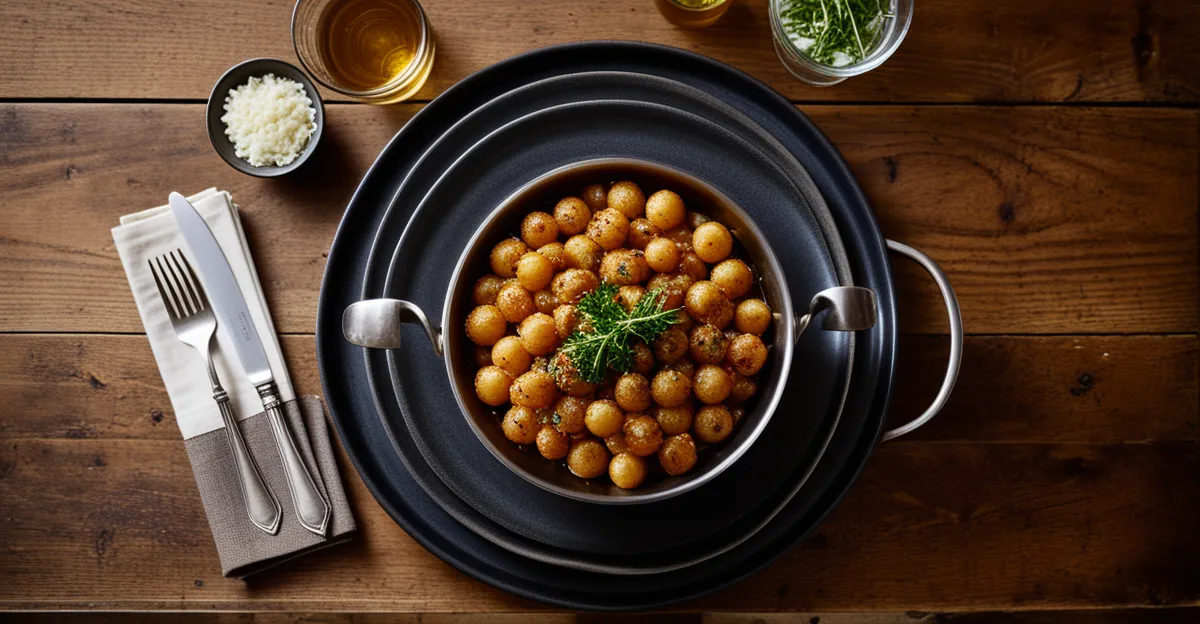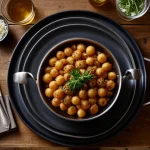Defining Traditional British Cuisine
Traditional British food embodies a rich tapestry of hallmark British dishes rooted deeply in cultural and historical significance. Central to this cuisine are classic dishes like roast beef, fish and chips, and shepherd’s pie, each showcasing the essence of British culinary identity. These dishes reflect diverse influences yet maintain their unique character through the use of historical British ingredients.
At the foundation of traditional British cooking lie staple ingredients such as root vegetables, various cuts of meat, and dairy products, essential in creating hearty, comforting meals. These ingredients not only sustain the classic flavors but also connect the present-day palate to centuries of culinary heritage. For example, root vegetables like carrots and parsnips have long been valued for their availability and storage qualities during colder months, making them indispensable to traditional recipes.
Also to discover : What are the essential spices for a traditional British curry?
Understanding traditional British cuisine involves recognizing how these dishes and ingredients shaped social and cultural life—highlighting not just food preferences but also economic and geographic factors in Britain’s history. This culinary foundation continues to influence British dietary habits and contemporary cooking practices.
Defining Traditional British Cuisine
Traditional British food embodies a rich tapestry of hallmark British dishes and historical British ingredients that have shaped the nation’s culinary identity. At the heart are classic dishes such as roast beef, fish and chips, and shepherd’s pie. These meals rely heavily on foundational ingredients like root vegetables—think carrots, parsnips, and potatoes—alongside various meats and dairy products. The emphasis on these ingredients reflects the agricultural history and climate of the British Isles.
Also read : What Are the Essential Ingredients for Authentic British Recipes?
The cultural significance of traditional British cooking runs deep. These dishes often represent communal meals, seasonal cycles, and local availability of produce throughout history. This cuisine illustrates how British society adapted simple, hearty ingredients into comforting meals enjoyed across all social classes. Understanding traditional British food requires appreciation of this historical context, where flavors were developed through necessity as much as taste.
These recipes and ingredients continue to influence modern culinary practices, highlighting the enduring legacy of Britain’s food heritage and the pride in maintaining these historical British ingredients within contemporary cooking.
Evolution of British Ingredients and Techniques
Traditional British food has been shaped by British culinary history, reflecting a deep connection to heritage ingredients and classic cooking methods. Preservation techniques such as pickling, curing, and smoking have long played a vital role, allowing staple ingredients like root vegetables and meats to be stored through harsh winters. These methods, born from necessity, are still influential today, with chefs incorporating them to add authentic flavor and depth.
Classic British cooking methods—like roasting, boiling, and slow braising—continue to guide contemporary cooking practices. For example, slow-cooked stews and roasts maintain their popularity by preserving traditional textures and flavors, even as new ingredients are introduced. This blend of time-honored methods with modern culinary creativity helps maintain the essence of British heritage dishes.
Today’s chefs adapt heritage ingredients to suit changing tastes, reviving dishes that honour tradition but embrace fresh, local produce. This ongoing evolution reflects a respectful innovation, ensuring that the cooking techniques and ingredient choices rooted in British history remain relevant and appreciated in modern kitchens.
Evolution of British Ingredients and Techniques
Preserving heritage ingredients remains central to British culinary history, ensuring that flavors tied to tradition are not lost. Ingredients such as root vegetables, specific cuts of meat, and dairy products continue to be staples, even as modern recipes embrace fresh twists. This preservation reflects respect for the past while inviting innovation in the kitchen.
Classic cooking methods like roasting, boiling, and slow braising have profoundly influenced contemporary British chefs. These techniques, honed over generations, optimize flavor extraction and tenderness, forming the backbone of many dishes labeled as traditional British food. Chefs today often adapt these methods, merging them with new technologies to create nuanced textures and tastes.
Adaptation is key in blending history with modernity. Traditional recipes like shepherd’s pie or roast beef are frequently reinterpreted to suit contemporary palettes—whether by incorporating seasonal ingredients or adjusting presentation styles. This evolution respects the essence of hallmark British dishes while keeping them relevant. The result is a cuisine that honors its roots while appealing to diverse, modern tastes across the UK.
Modern UK Cooking Trends Shaped by Tradition
Modern British cuisine embraces culinary fusion, blending traditional British food with global influences to create innovative dishes. This trend reflects evolving tastes while honouring hallmark British dishes like roast beef and shepherd’s pie, which are often reimagined with fresh ingredients or novel presentations. Such adaptations keep historical elements relevant without losing their essence.
A prominent food trend in the UK is the farm-to-table movement, emphasizing regional sourcing of heritage ingredients. This approach supports local producers and highlights the natural flavours of root vegetables and meats, core to traditional recipes. Culinary fusion benefits from these quality ingredients, maintaining authenticity even in modern expressions.
British street food and popular UK restaurants frequently showcase this blend of old and new, serving dishes that respect the lineage of historical British ingredients while inviting creative experimentation. By integrating international techniques and flavours, contemporary chefs offer diners vibrant, approachable menus that celebrate British food culture’s dynamic nature, ensuring historic foods remain part of today’s exciting culinary landscape.
Modern UK Cooking Trends Shaped by Tradition
Modern British cuisine thrives on a vibrant blend of culinary fusion and respect for its roots. Today’s food trends UK spotlight farm-to-table practices and regional sourcing, emphasizing freshness and sustainability. These trends echo traditional British values around local ingredients but with a contemporary twist that appeals widely.
Chefs creatively reimagine hallmark British dishes like fish and chips or shepherd’s pie, integrating global flavors without abandoning the essence of traditional British food. This fusion has made British cuisine dynamic, attracting diverse palates while honoring its heritage. For example, combining classic roast beef with innovative spice blends demonstrates how the past meets present in the kitchen.
Street food and popular UK restaurants increasingly showcase this evolution, making traditional flavors accessible and exciting. Integrating historical British ingredients into modern dishes keeps these culinary treasures alive and relevant, ensuring the ongoing popularity and adaptability of British food traditions. The synergy between tradition and innovation marks the foundation of current food trends UK, positioning British cuisine as both rooted and forward-looking.
Expert Insights and Industry Perspectives
Leading British chefs and culinary experts UK often emphasize the continuing influence of traditional British food on contemporary menus. They note that while innovation drives the industry, the foundation built by hallmark British dishes remains indispensable. This reflects a deep respect for historical British ingredients that define the country’s culinary identity.
Experts recognize that preserving recipes like roast beef or shepherd’s pie provides not only flavour but cultural continuity. Many top chefs incorporate heritage ingredients alongside global techniques to create dishes that honour tradition while appealing to modern palates. Such fusion showcases how British cuisine adapts without losing authenticity.
Restaurateurs underscore the value of storytelling through food, connecting diners to Britain’s culinary history. Their case studies often highlight how menus balance classic dishes with fresh interpretations, supporting both local producers and evolving tastes. This expert perspective solidifies the importance of traditional British food as a vibrant, living influence within the UK’s dynamic culinary scene.
Expert Insights and Industry Perspectives
Leading British chefs and culinary experts UK emphasize the profound influence of traditional food on contemporary cooking. They highlight how hallmark British dishes serve as foundations for creativity, ensuring continuity amidst innovation. According to these experts, techniques developed through British culinary history remain vital, guiding both classic and modern dishes.
In practical terms, chefs integrate historical British ingredients like root vegetables and specific meat cuts to maintain authenticity, even when experimenting with global flavors. This blend of respect and reinvention allows for preserving heritage without stagnation. For example, a noted chef might reinvent shepherd’s pie by infusing novel spices yet retaining core textures and ingredients, illustrating tradition’s flexible role.
Industry perspectives also reveal how restaurants across the UK balance honoring traditional British food roots with appealing to evolved palates. Case studies show successful ventures often focus on sourcing local heritage ingredients, enhancing both taste and sustainability. This expert consensus underscores a shared commitment: keeping hallmark British dishes relevant, vibrant, and rooted in history, while embracing contemporary culinary advances.
Defining Traditional British Cuisine
Traditional British food is best understood through its enduring hallmark British dishes like roast beef, fish and chips, and shepherd’s pie, which have become symbols of national identity. These dishes hinge on the use of historical British ingredients such as root vegetables, various meats, and dairy products. Why these ingredients? Their availability and versatility shaped the dishes over centuries.
Root vegetables—carrots, parsnips, and potatoes—are staples because they were easily cultivated and stored, especially during Britain’s colder months. Meat cuts, often roasted or slow-cooked, provided sustenance across social classes, while dairy products like butter and cream added richness and texture.
The cultural importance of traditional British cooking lies in its reflection of local agriculture, climate, and historical social structures. Meals like shepherd’s pie not only filled bellies but also fostered communal dining, reinforcing social bonds. Ultimately, these historical British ingredients and dishes offer a window into Britain’s past, revealing how necessity and regional resources sculpted a cuisine both humble and hearty.





